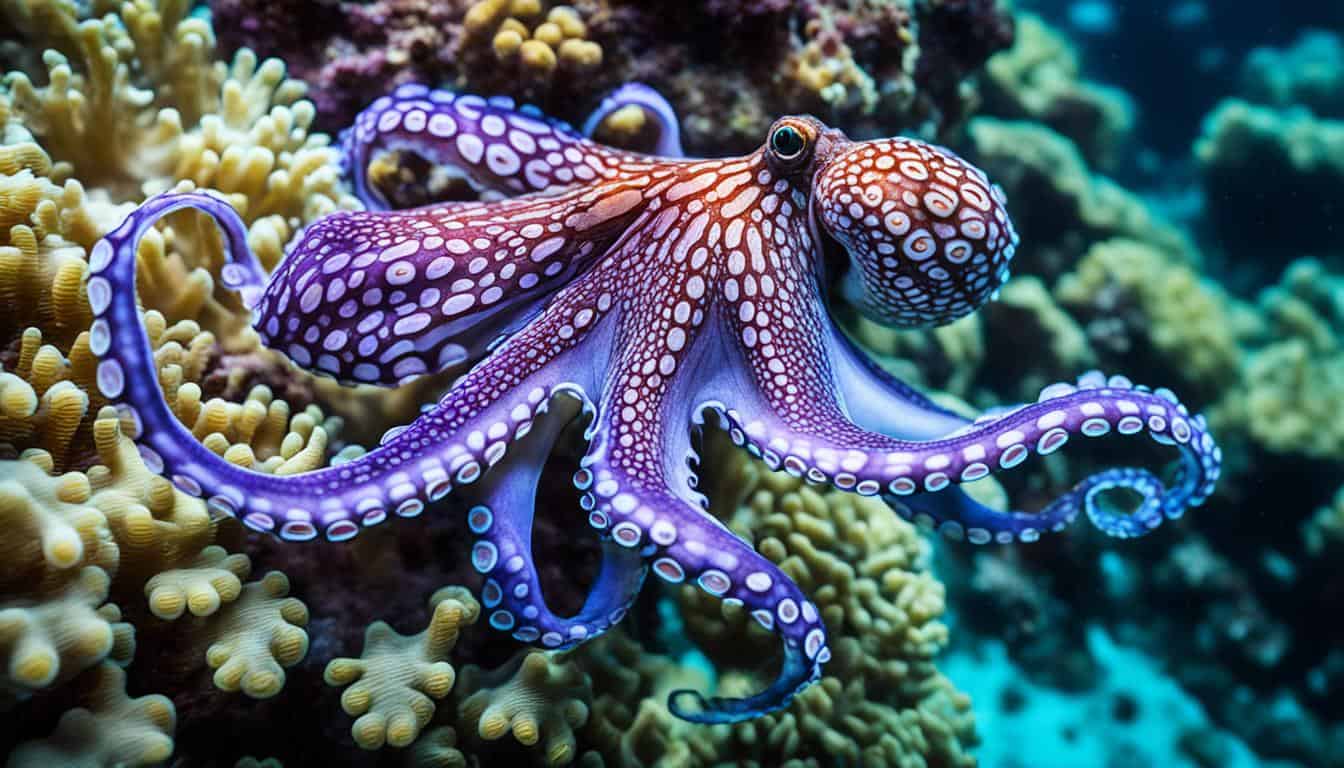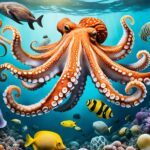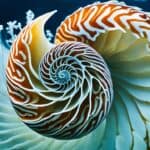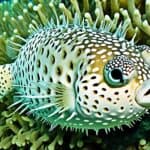Octopuses are amazing creatures that have caught our attention for a long time. They have special traits and behaviors that make them stand out. So, what makes an octopus so special? Let’s dive into their world and explore their classification, looks, and role in the ocean.
Get ready to discover some fascinating facts about octopuses. You’ll learn about their importance in the ocean and meet different types of octopuses. This will help you appreciate these incredible beings even more.
What is an octopus?
Learning about octopuses reveals their amazing nature. They are part of the Cephalopoda class, which also includes squid and nautiluses. Octopuses stand out with their unique anatomy and behaviors, making them a favorite among sea lovers.
Scientific Classification and Anatomy
Octopuses are classified under the order Octopoda and family Octopodidae. They are invertebrates known for their flexible bodies. Each octopus has eight arms with suction cups, perfect for moving and catching food. Their anatomy is designed for survival, with a special beak for eating.
Physical Characteristics
Octopuses can change their color and texture with special cells called chromatophores. This helps them hide and talk to other octopuses. They vary in size, from tiny to the giant Pacific octopus, which can be over 10 feet long. They even have three hearts to keep their blood flowing.
The Role of Octopuses in Marine Ecosystems
Octopuses are key in marine ecosystems as both hunters and hunted. They keep the populations of other sea creatures in check. Their smart hunting ways show their intelligence, making them important in their homes. Without them, the ocean would be very different.
| Octopus Characteristics | Details |
|---|---|
| Body Structure | Soft-bodied with eight flexible arms |
| Color Change | Uses chromatophores for camouflage and communication |
| Size | Ranges from inches to over 10 feet |
| Hearts | Three hearts circulate blood |
| Habitat Role | Major predator and prey in marine ecosystems |
Intriguing octopus facts
The octopus is a remarkable creature, full of intriguing features. It has a short life but is fascinating to learn about. They have three hearts and their blood is different from ours. Let’s explore these amazing octopus facts.
Longevity and Lifespan
Octopuses live short lives, from six months to five years. Their lifespan varies with their reproductive patterns. After mating, many female octopuses change a lot and their health declines. This affects their lifespan.
Three Hearts Mechanism
Octopuses have three hearts, a unique feature. Two hearts pump blood to the gills for oxygen. The third heart sends oxygenated blood to the body. This system helps them stay active underwater.
Unique Blood Composition
Octopus blood has a copper-rich protein called hemocyanin. This protein helps them breathe in cold, low-oxygen water. Their blood is special, making them adaptable to their environment.
| Factor | Details |
|---|---|
| Average Lifespan | 6 months to 5 years |
| Hearts | Three |
| Blood Protein | Hemocyanin (copper-based) |
| Oxygen Efficiency | Adaptation to low-oxygen environments |
Octopus species you should know
There are about 300 octopus types, each with its own special traits and behaviors. Learning about these species helps us understand their homes and how they adapt.
Common Types of Octopus
Some octopus species are more interesting than others. Let’s look at a few:
- Common Octopus (Octopus vulgaris): Known for its smarts and flexibility.
- Blue-ringed Octopus (Hapalochlaena spp.): Small but deadly, with bright blue rings to scare off predators.
- Giant Pacific Octopus (Enteroctopus dofleini): The biggest octopus, reaching huge sizes and showing complex behaviors.
Habitat Distribution across Species
Octopuses live in many places, from coral reefs to the deep sea. Their homes affect how they eat and find mates, which is key to surviving.
Unique Features of Different Species
Each octopus has special traits that help it live well. The Blue-ringed Octopus uses strong venom to protect itself. The Giant Pacific Octopus is smart, using tools to get food.
Octopus characteristics: More than meets the eye
Octopuses are more than just fascinating creatures; they show off amazing octopus intelligence. They have interesting octopus behavior and use smart hunting strategies. Let’s explore these traits further.
Intelligence and Problem Solving
Octopuses are seen as some of the smartest invertebrates around. They can solve complex problems. For example, they can find their way through tricky mazes and use tools. They also have unique personalities that help them adjust to different situations.
This shows how smart and adaptable they are, helping them survive in many places.
Behavior and Communication
Getting to know octopus behavior helps us see how complex they are. They talk to each other by changing their skin color and texture. If they feel threatened, they can change to look like their surroundings, which is amazing.
This helps them defend themselves and talk to others in their group.
Feeding and Hunting Strategies
Octopuses have different hunting strategies for their homes. They hunt at night and sneak up on fish and crustaceans. They use their smarts to catch hard-to-get prey.
This mix of smarts and strategy makes them great hunters in the ocean.
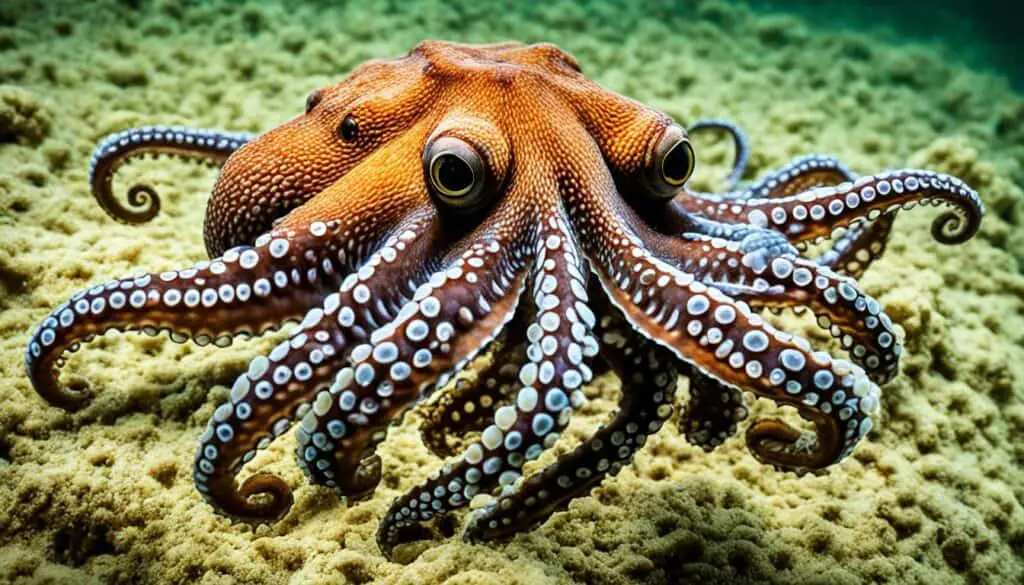
Understanding octopus behavior
Exploring octopus behavior shows us how they live alone and reproduce. These creatures have interesting traits that shape their lives and how they interact with their world.
Solitary Living and Dens
Most octopuses prefer to live alone, making their own dens with rocks and other items. These dens are safe places and spots for hunting. Octopuses are very protective of their dens, fighting off any intruders.
The design and location of these dens can change a lot between species. This shows how well they adapt to different ocean environments.
Reproduction and Life Cycle
Octopus reproduction is quite complex and varies by species. Males mate with females in the den, using special tentacles to transfer sperm. After that, females take care of their eggs, protecting and feeding them until they hatch.
This care comes at a cost, as females often stop eating and may die soon after the eggs hatch. The life of an octopus shows how their behavior is linked to survival. It highlights the balance between caring for their young and facing the dangers of the ocean.
Octopus habitat: Where do they live?
Octopuses live in many parts of the ocean, each species fitting into its own special spot. They love places full of life and different landscapes. This makes their homes rich and varied.
Distribution in Ocean Regions
Octopuses live in oceans all over the world. They like both shallow and deep waters. They’re found in warm and cool places, especially in warm ones.
Some octopuses like rocky places, while others prefer sandy bottoms. These spots give them a place to hide and hunt.
Environmental Factors Affecting Habitat
Many things affect where octopuses live. These include:
- Water temperature: Warm waters are home to more octopuses.
- Salinity levels: These affect how octopuses live and where they can be found.
- Oxygen availability: Octopuses need lots of oxygen to survive.
- Food supply: Octopuses like places with lots of food, like crustaceans and small fish.
- Seafloor structure: Places with coral reefs or rocky areas are good for them.
| Ocean Region | Common Species | Typical Depth | Primary Habitat Features |
|---|---|---|---|
| Tropical Ocean | Common Octopus, Blue-ringed Octopus | 0 – 100 meters | Coral reefs, rocky landscapes |
| Temperate Ocean | Giant Pacific Octopus, Mimic Octopus | 0 – 300 meters | Sea grass beds, tide pools |
| Deep Sea | Vampire Squid, Deep-sea Octopus | 300 meters and deeper | Soft sediment, hydrothermal vents |
The fascinating diet of the octopus
The octopus diet is quite interesting, mainly made up of crustaceans. They eat crabs, shrimp, and lobsters, showing how adaptable and opportunistic they are. Big octopuses can even eat small fish and sharks, proving their skill in the sea.
Octopuses hunt with stealth and speed. They can sneak up on prey without being seen. Then, they use their strong suction cups to catch their food quickly. This shows how smart and strategic they are in getting food in a tough ocean world.
Learning about the octopus diet is more than just knowing what they eat. They play a key role in keeping the ocean healthy. By controlling crustacean and fish numbers, octopuses help maintain the balance of the ocean. This keeps the ocean diverse and healthy.
FAQ
What is an octopus?
An octopus is a soft-bodied marine animal. It belongs to the class Cephalopoda. These creatures have eight long arms with suction cups. Octopuses are known for their intelligence and how they move through the water.
How long do octopuses live?
Octopuses can live from six months to five years, depending on the species. Many die soon after they reproduce because of big hormonal changes.
Are all octopuses solitary creatures?
Yes, most octopuses live alone and protect their own space. They build dens with materials they find and guard them as their own homes.
How intelligent are octopuses?
Octopuses are seen as very smart invertebrates. They can solve puzzles, use tools, and show complex problem-solving skills.
What types of octopus species are there?
There are about 300 octopus species known, each with its own traits and behaviors. Some well-known ones include the Common Octopus, Blue-ringed Octopus, and Giant Pacific Octopus.
What do octopuses eat?
Octopuses mainly eat crustaceans like crabs, shrimp, and lobsters. Some can even hunt bigger prey, such as small fish and sharks, thanks to their stealth and speed.
Where do octopuses live?
Octopuses live in oceans all over the world, from shallow to deep waters. They like warm, tropical places but can adapt to different environments.
How do octopuses hunt?
Octopuses hunt by being stealthy and quick. They surprise their prey from above. Their arms with suction cups help them catch and hold onto their food fast.
How do octopuses communicate?
Octopuses mostly talk through body language and color changes. They also show complex behaviors that suggest they communicate with each other.
What role do octopuses play in marine ecosystems?
Octopuses are key to keeping marine ecosystems balanced. They control the number of their prey, which helps maintain the food web.

